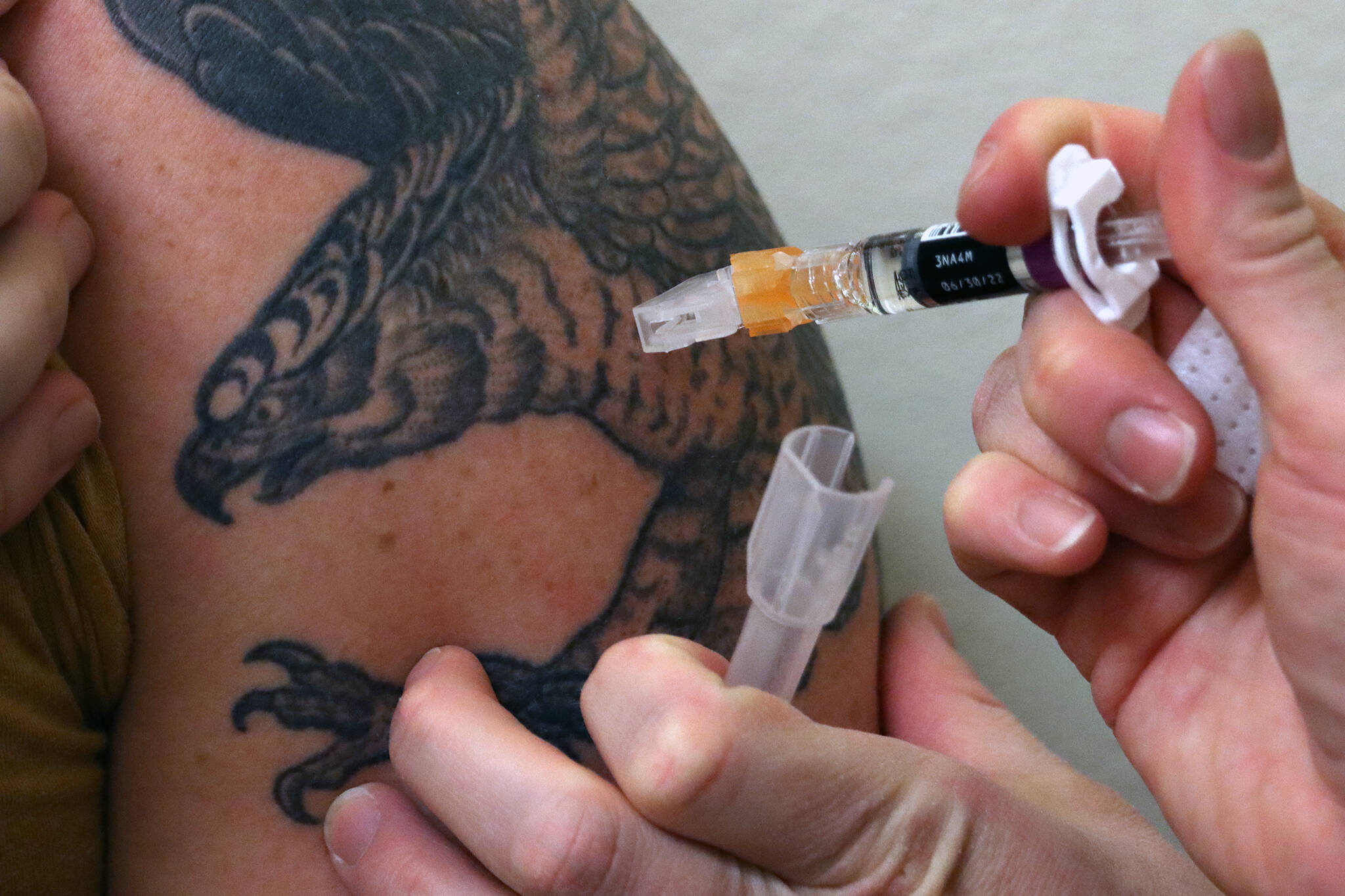The number of omicron variant COVID-19 cases is increasing nationwide, but state health officials said Thursday none had yet been identified in Alaska.
“We know a lot about COVID, we were expecting this,” said Dr. Anne Zink, Alaska’s chief medical officer, during the state’s weekly update. “We continue to learn from around the world.”
The number of COVID-19 cases in the state had dropped by 27% from the previous week, according to Zink, and some regions of the state had decreased their overall COVID-19 risk levels.
Information about the variant is still coming out, Zink said, but existing tests are able to detect the virus. President Joe Biden announced a plan Thursday to greatly expand access to at-home testing kits, which the City and Borough of Juneau began doing on Nov. 10. At-home test kits will only show that a person is positive for COVID-19, Zink said, not which variant they may have.
Zink also encouraged Alaskans to get flu vaccines during the winter months.
Hospitalizations are declining in Alaska, Zink said, but hospitals are still full of patients, both COVID-19 and otherwise. Bartlett Regional Hospital has reported no COVID-19 patients for the past several days.
State data shows the state reaching its highest levels of hospitalizations in late October before sharply declining. Data on vaccine immunity to the omicron variant is still coming out, Zink said, but said Alaskans should get vaccinated or receive booster shots for COVID-19.
“Imperfect protection is better than no protection at all,” Zink said.
Just over half of the state is fully vaccinated and 57% —which now includes children age five and older — and 61% of eligible Alaskans have received at least one dose, according to state data. In Juneau those numbers are even higher. According to the City and Borough of Juneau, 71.7% of the city’s total population is fully vaccinated and the city is preparing clinics for a second round of pediatric vaccinations.
Health officials have stressed the limited data on the variant and a Nov. 28, update from the World Health Organization said understanding its impacts could take weeks. It is unclear whether the omicron variant causes more severe disease compared to infections with other variants — including the delta variant — according to the WHO, and there is currently no information to suggest that symptoms are different from those from other variants.
[Biden to announce testing, booster expansion]
Fully vaccinated people have tested positive for the COVID-19, but health officials have noted that while the number of positive cases has increased, the number of hospitalizations has not. According to the WHO, preliminary data suggests there are increasing rates of hospitalization in South Africa where the variant was first identified but this may be due to increasing overall numbers of people becoming infected, rather than a result of specific infection with omicron.
In an announcement Thursday, Biden said he wanted to increase the availability of testing and shots without any major restrictions on daily life, according to the White House. There are increased restrictions on international travelers, the president said. Starting next week all travelers — regardless of nationality or vaccination status — will need to provide proof of a negative COVID-19 test within one day of boarding flights.
U.S. health officials said the delta variant of COVID-19 is still the most contagious and common variant in the country, AP reported, with some states reporting record numbers of hospitalizations. Vermont, New Hampshire, Maine, and Nebraska all recently reported record-high hospitalizations due to COVID-19, AP reported.
In Minnesota, which ranks third for most new cases per capita, the Pentagon sent medical teams last month to two major hospitals to relieve doctors and nurses, AP said, and another team is set to arrive Friday.
In September, Gov. Mike Dunleavy signed an emergency health order that helped bring additional health care workers to the state. Many of those workers are nearing the end of their contracts, said Gene Wiseman, section chief for the Department of Health and Social Services Division of Public Health, but the state was taking steps to ensure health care facilities were well staffed.
The state has about 470 nurses with individual contracts through a company called SnapNurse, Wiseman said, many of whom were not going to renew their contracts. Wiseman said the state is working hard to identify which nurses wouldn’t be staying and hire staff to replace them. Hiring flexibilities provided to hospitals by the emergency order expire at the end of January, 2022, Wiseman said. Heidi Hedberg, director of Public Health, said some nurses —whose salaries are reimbursed by the Federal Emergency Management Agency —have chosen to stay in Alaska.
Katie Bausler, spokesperson for Bartlett Regional Hospital, said in an email the hospital has 10 nurses and surgical technicians whose contracts end in January.
• Contact reporter Peter Segall at psegall@juneauempire.com. Follow him on Twitter at @SegallJnuEmpire.

